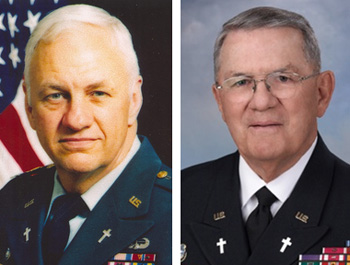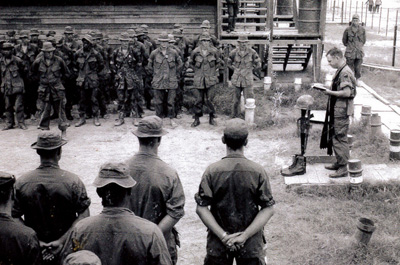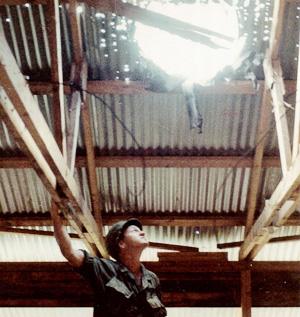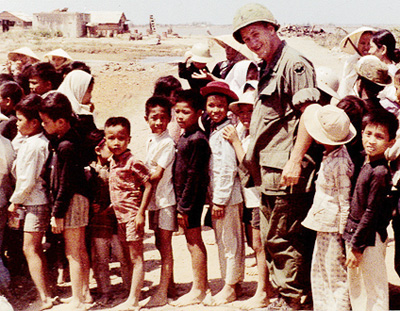SUMTER, S.C. (BP)—Army chaplain Charlie Clanton found it difficult to look at the severely burned young soldier at a makeshift medical evacuation station in Vietnam. The soldier’s face had been charred beyond recognition by a Viet Cong grenade launcher attack.
 Chaplains Steve Gantt and Charlie Clanton today.As Clanton, a Southern Baptist chaplain during the Vietnam War, walked to the gurney and bumped it, the young solder opened his eyes.
Chaplains Steve Gantt and Charlie Clanton today.As Clanton, a Southern Baptist chaplain during the Vietnam War, walked to the gurney and bumped it, the young solder opened his eyes.
“Sir, you were right the other night,” he told Clanton.
“Right about what?” Clanton asked, not sure which worship service the young man had attended. Later, he realized it had been two weeks earlier when he had taught on Psalm 23 in a quickly assembled worship service in the mess hall.
‘God kept me going’
“The other night when you told us about ‘the valley of the shadow of death.’ I was there tonight, sir,” the soldier said. “And God kept me going.”
Later that night, the young man died on a helicopter en route to the hospital.
“That statement to me, a young minister—‘What you’re telling me is right. What God said he would do, he did. He kept me going that night.’—that really helped me see that my ministry was worthwhile,” Clanton said.
Clanton later received a Silver Star for his term in Vietnam for leading troops through hostile territory and back to base camp after an injury to a commanding officer.
Sign up for our weekly edition and get all our headlines in your inbox on Thursdays
This year marks the 40th anniversary of the end of the Vietnam War. Although American involvement there began in the early 1950s, the United States first sent ground troops to the Southeast Asian country in 1965 to help the South Vietnamese push back communist aggression. U.S. troops officially left Vietnam in March 1973 after eight years of stateside social unrest over the war.
 Southern Baptist Vietnam War Chaplain Steve Gantt officiates the memorial service for two soldiers killed in action. (NAMB Photo provided by Steve Gantt)Clanton was among 300 Southern Baptist chaplains in a 10-year period who served in the war. Southern Baptist chaplains played a key role in providing spiritual guidance and support for more than 530,000 American soldiers.
Southern Baptist Vietnam War Chaplain Steve Gantt officiates the memorial service for two soldiers killed in action. (NAMB Photo provided by Steve Gantt)Clanton was among 300 Southern Baptist chaplains in a 10-year period who served in the war. Southern Baptist chaplains played a key role in providing spiritual guidance and support for more than 530,000 American soldiers.
Chaplain Steve Gantt, who served in Vietnam for a year in the late 1960s, said many soldiers told him they felt safer when the chaplain was around.
“I didn’t necessarily feel like that,” Gantt said with a laugh. “But I did have a chance to tell them that God cares for you—even in this hellish place. That was repeated time and time again.”
Worship in dangerous places
Worship services often were held in dangerous places, Gantt said. For Gantt’s safety, his commanding officer sent a vehicle with a 50-caliber machine gun with the chaplain when he left the base.
 Southern Baptist Chaplain Steve Gantt looks up at a hole in the battalion chapel where he served in Vietnam. The hole was caused by a 91 mm mortar round. Gantt said the chapel took eight such direct hits while he served there. (NAMB Photo provided by Steve Gantt)“I’ll occasionally open up a book and see a place where we held services. If you look carefully, you’ll see a guy manning a post-mounted 50-caliber machine gun to keep the enemy off of us as we were taking time out of the middle of the day worshiping,” said Gantt, who was a member of the same ROTC chapter as Clanton at Furman University in the 1950s.
Southern Baptist Chaplain Steve Gantt looks up at a hole in the battalion chapel where he served in Vietnam. The hole was caused by a 91 mm mortar round. Gantt said the chapel took eight such direct hits while he served there. (NAMB Photo provided by Steve Gantt)“I’ll occasionally open up a book and see a place where we held services. If you look carefully, you’ll see a guy manning a post-mounted 50-caliber machine gun to keep the enemy off of us as we were taking time out of the middle of the day worshiping,” said Gantt, who was a member of the same ROTC chapter as Clanton at Furman University in the 1950s.
Both Gantt and Clanton gave a similar description of their ministries. Besides leading worship services wherever they found a place, chaplains counseled soldiers, officiated memorial services, visited the wounded and spent time getting to know their makeshift congregations.
Gantt noted much of his counseling time was spent helping soldiers deal with the moral objections to the war, a discussion fueled by the growing antiwar movement in the United States.
 Southern Baptist Chaplain Steve Gantt interacts with Vietnamese children during the Vietnam War. Gantt says chaplains and doctors often assisted the local church with food and medical supplies when time and circumstances permitted. (NAMB Photo provided by Steve Gantt)“My observation was that the choice usually came down to: ‘Well, I’m in this. That guy that’s on my right and on my left, he’s here and wants to get home. And I’m here and want to get home. I’m going to fight for my brother—not just myself. Our safety will largely depend upon how well we do what we do even in the intensity of combat.’ It’s a proposition that most soldiers shared once they were exposed to combat.”
Southern Baptist Chaplain Steve Gantt interacts with Vietnamese children during the Vietnam War. Gantt says chaplains and doctors often assisted the local church with food and medical supplies when time and circumstances permitted. (NAMB Photo provided by Steve Gantt)“My observation was that the choice usually came down to: ‘Well, I’m in this. That guy that’s on my right and on my left, he’s here and wants to get home. And I’m here and want to get home. I’m going to fight for my brother—not just myself. Our safety will largely depend upon how well we do what we do even in the intensity of combat.’ It’s a proposition that most soldiers shared once they were exposed to combat.”
Result of social unrest
American social unrest during the period—often centering on the war—made the troops’ return difficult, whether in 1973 or earlier. Clanton remembers being told to dress in civilian clothes as he traveled back to the United States through San Francisco on his way to a new assignment in 1968.
“I see such an improvement today,” Clanton said. “You see stories every day about troops coming home. You turn on CNN Headline News, and they do a salute to a soldier overseas. They do that during the morning news, still. Now when we welcome troops home, we welcome them home well. I think our country learned a great lesson from Vietnam.”
Clanton said he has been “welcomed home” numerous times in the last few years along with Iraq veterans. Often, he said, churches and other organizations will add Vietnam veterans to their welcome, because they know many weren’t treated well upon their return four decades earlier.
The improvement in the treatment of returning veterans has been seen throughout Southern Baptist life as well, Gantt said.
“Quite frankly, I think our denomination has done a much better job of bringing the needs of our troops overall and the ministry of our chaplains in particular in front of our churches,” he said.
Chaplains Clanton and Gantt continued their ministry on active duty with the Army until retirement in the early 1990s. Clanton now serves as pastor to senior adults at First Baptist Church in Sumter, S.C. Gantt serves as the transitional pastor of Sandy Level Baptist Church in Blythewood, S.C.















We seek to connect God’s story and God’s people around the world. To learn more about God’s story, click here.
Send comments and feedback to Eric Black, our editor. For comments to be published, please specify “letter to the editor.” Maximum length for publication is 300 words.